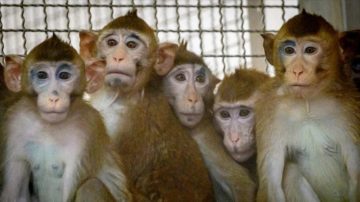Gemma Conroy in Nature:
 In 2019, immunologist Jonah Sacha received a shipment of monkeys for his research into infectious diseases. But while conducting preliminary chest X-rays, Sacha found one monkey that stood out for all the wrong reasons: it was carrying the bacterium that causes tuberculosis (TB). The infected animal rendered the entire shipment of 20 monkeys unusable for research because of the risk that the infection would spread. “We lost all of those animals,” says Sacha, who investigates stem-cell transplants as a treatment for HIV at the Oregon Health & Science University’s Oregon National Primate Research Center in Beaverton. “That cost hundreds of thousands of dollars of damage and delayed our research by many years.”
In 2019, immunologist Jonah Sacha received a shipment of monkeys for his research into infectious diseases. But while conducting preliminary chest X-rays, Sacha found one monkey that stood out for all the wrong reasons: it was carrying the bacterium that causes tuberculosis (TB). The infected animal rendered the entire shipment of 20 monkeys unusable for research because of the risk that the infection would spread. “We lost all of those animals,” says Sacha, who investigates stem-cell transplants as a treatment for HIV at the Oregon Health & Science University’s Oregon National Primate Research Center in Beaverton. “That cost hundreds of thousands of dollars of damage and delayed our research by many years.”
In a lot of ways, Sacha was lucky that he detected the diseased monkey: if it had made its way into a medical trial, it could have confounded the results, says Ricardo Carrion, a microbiologist at the Texas Biomedical Research Institute’s Southwest National Primate Research Center in San Antonio. Sacha doesn’t know how the monkeys got TB — research monkeys are typically captive-bred, which should guarantee that they are free of diseases. But the risk of disease is a growing concern among scientists who work with monkeys; news reports suggest that some laboratory monkeys are being illegally poached from the wild, falsely labelled as captive-bred and sold as research animals, a practice known as monkey laundering.
More here.
